i
i
Bali, 24-26 July 2023
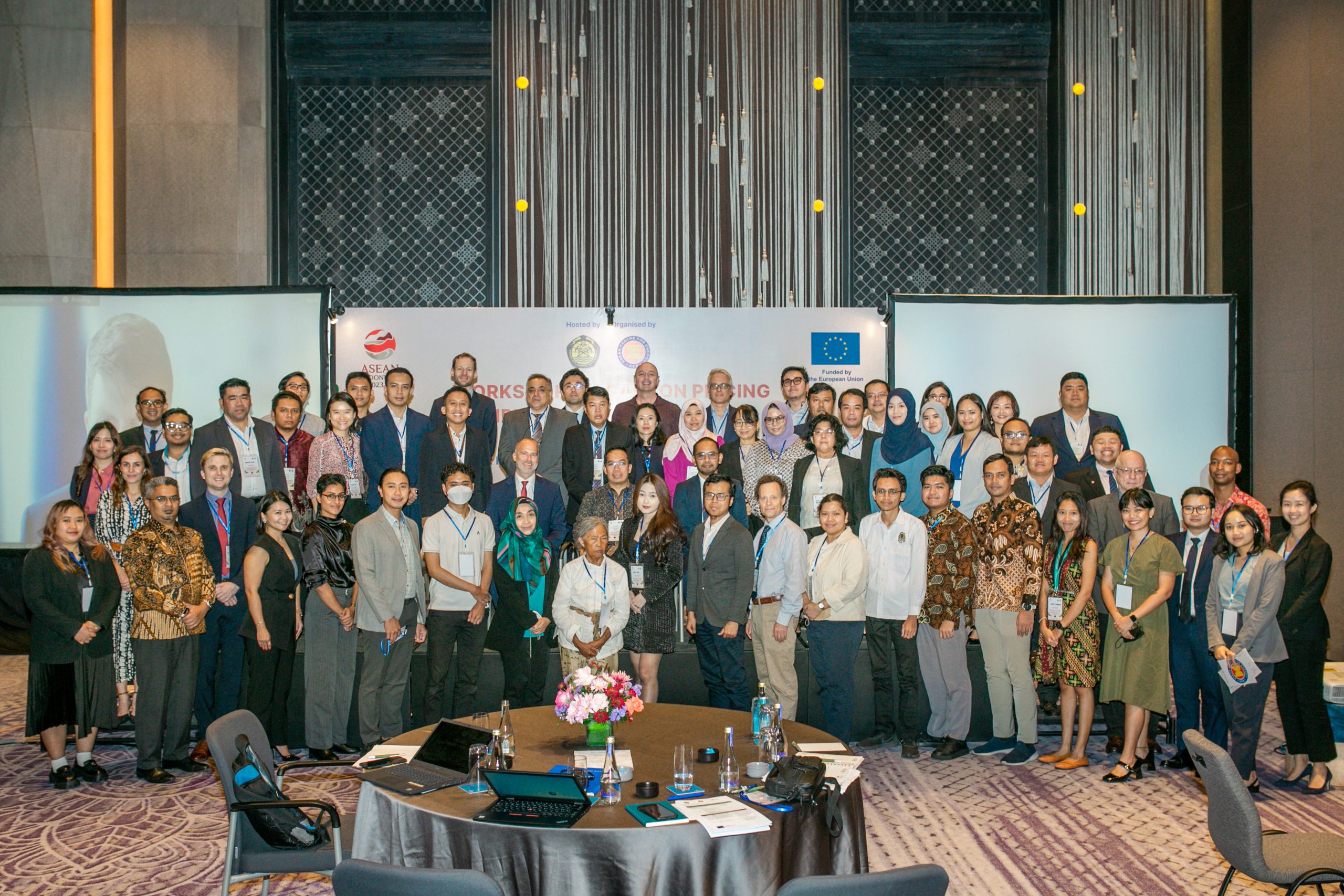
All Participants and Speakers of the Workshop on Carbon Pricing Implementation in ASEAN in Bali, 24-26 July 2023
The ASEAN Centre for Energy (ACE), through the ASEAN Climate Change and Energy Project (ACCEPT) Phase II, has co-organised the “Workshop on Carbon Pricing Implementation in ASEAN” with the Technical Assistance Facility to the Green Team Europe Initiative (TAF-GTEI) with the support from the European Union as well as the Norwegian Government, and hosted by the Ministry of Energy and Mineral Resources (MEMR) of Indonesia.
The three-day workshop, held from 24 to 26 July 2023 in Bali, Indonesia, aimed to foster dialogue, knowledge sharing, and capacity enhancement on carbon pricing within the ASEAN region. The workshop aligned with Indonesia’s Annual Energy Priority as the ASEAN Chairman for 2023, focusing on accelerating climate action and promoting sustainable energy solutions within the region.
The workshop brought together industry experts, international organisations, and the ASEAN Member States (AMS), along with representatives from the European Commission and the Norwegian Government, to discuss and exchange ideas on carbon pricing implementation and sustainable energy in the ASEAN region.
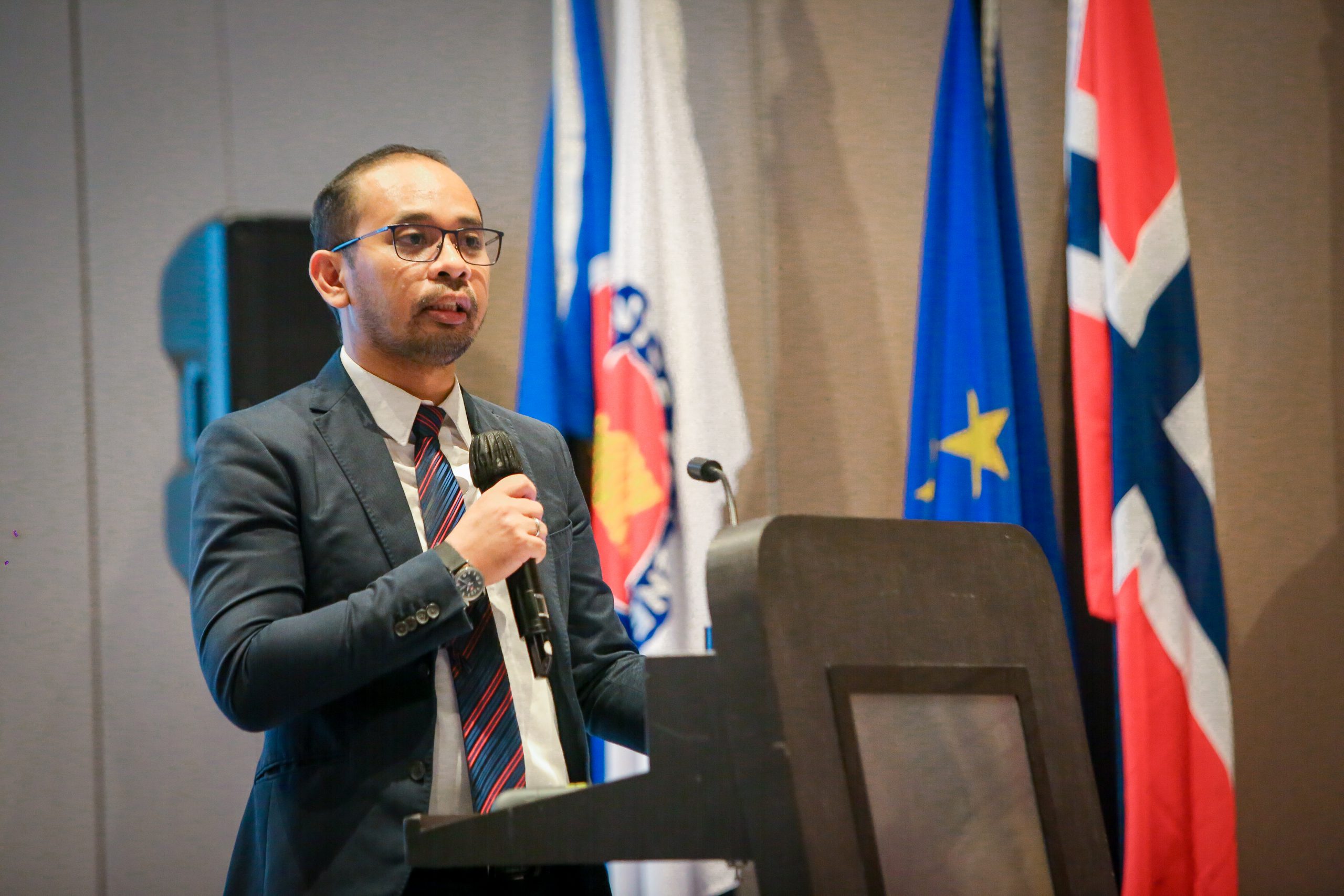
Mr Beni Suryadi, Manager of ACE, during the workshop’s opening ceremony
During the workshop’s opening ceremony, Mr Beni Suryadi, Manager of ACE, underscored the significance of carbon pricing in propelling ASEAN’s transition to a low-carbon economy. He highlighted the urgent need for sustainable solutions to meet the region’s soaring energy demand while curbing carbon emissions.
Mr Beni said, “ASEAN is poised to experience remarkable economic growth in the next few decades, resulting in a significant surge in energy demand. Under the baseline scenario in the 7th ASEAN Energy Outlook (AEO7), the regional energy demand is predicted to triple by 2050 compared to the levels in 2020. However, the rising energy demand has a substantial consequence of potentially escalating global carbon emissions, emphasising the urgency for sustainable and low-carbon solutions.”
He continued by emphasising carbon pricing is pivotal in driving ASEAN’s transition to a low-carbon economy, “Carbon pricing stands as a critical fiscal instrument to internalise the externality. It offers a market-based approach to incentivise the reduction of greenhouse gas emissions while fostering innovation and investment in cleaner and energy-efficient technologies. Ultimately, carbon pricing will be the catalyst for achieving the national, regional, and global climate agenda.”
Mr Lukas Gajdos, Chargé d’affaires a.i. at the EU Delegation to ASEAN, delivered opening remarks on behalf of the European Union. He spoke about the EU’s experience with carbon pricing, which dates back to 2005 and helped decouple economic growth from emissions. He emphasised the EU’s readiness to share its experience and to support carbon pricing implementation in ASEAN.
Representing the Norwegian Government, H.E. Kristian Netland, Chargé d’affaires at the Royal Norwegian Embassy Jakarta extended a warm welcome and appreciation for the participants during his opening remarks. He reaffirmed Norway’s commitment and support to addressing energy-climate issues in partnership with ASEAN, particularly through ACCEPT.
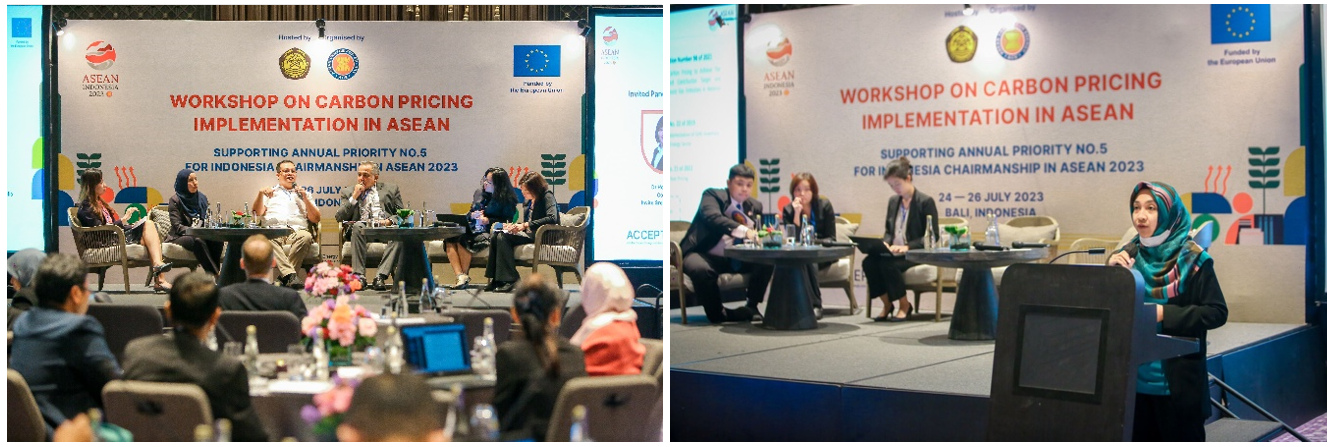
Workshop Day 1
On the first day that was moderated by Ms Aldilla Noor Rakhiemah, Senior Research Analyst of ACCEPT II and Mr I Dewa Made Raditya Margenta, Research Analyst of ACCEPT II participants delved into the concept of carbon pricing, exploring its two forms: carbon tax and Emissions Trading System (ETS) as discussed by Dr Hoyyen Chan, Expert from Invite Green Consultancy.
The workshop then brought participants to discuss the progress and implementation of carbon pricing in ASEAN. Singapore, represented by Ms Vanessa Koh, Senior Principal Analyst at EMA Singapore and Indonesia, represented by Ms Anandini Mayang Prabadiantari, Sub-Coordinator Electricity Environment Protection at MEMR Indonesia shared their experiences as early adopters of mandatory carbon pricing, while Malaysia, represented by Ms Falisya binti Noor Azam, Principal Analyst Secretary at MEGTW Malaysia discussed its exploratory work on carbon tax and ETS.
The Philippines, represented by H.E Felix William Fuentebella, Senior Official on Energy (SOE) Leader and Undersecretary of DOE Philippines, along with Myanmar, represented by Dr San Win, Director of the Environmental Conservation at MNREC Myanmar, and Lao PDR, represented by Mr Boualom Saysanavong, Director of Department of Energy Efficiency and Promotion at MEM Lao PDR, demonstrated their commitments in transitioning to low-carbon economy and achieving their NDCs. They also underscored their respective challenges and opportunities to promote carbon pricing in their region, portraying the necessities of sharing knowledge and capacity building within ASEAN. Mr Martin Hession, Directorate-General for Climate Action at European Commission, gave his insight from the European Union’s experience with carbon pricing. Key takeaways included the importance of gradual carbon tax increments, stakeholder engagement, and robust Monitoring, Reporting, and Verification (MRV) for effective implementation and improvement of carbon credits. Customising carbon pricing solutions to each country’s unique economic setup and enhancing government capacity were emphasised as crucial steps for success.
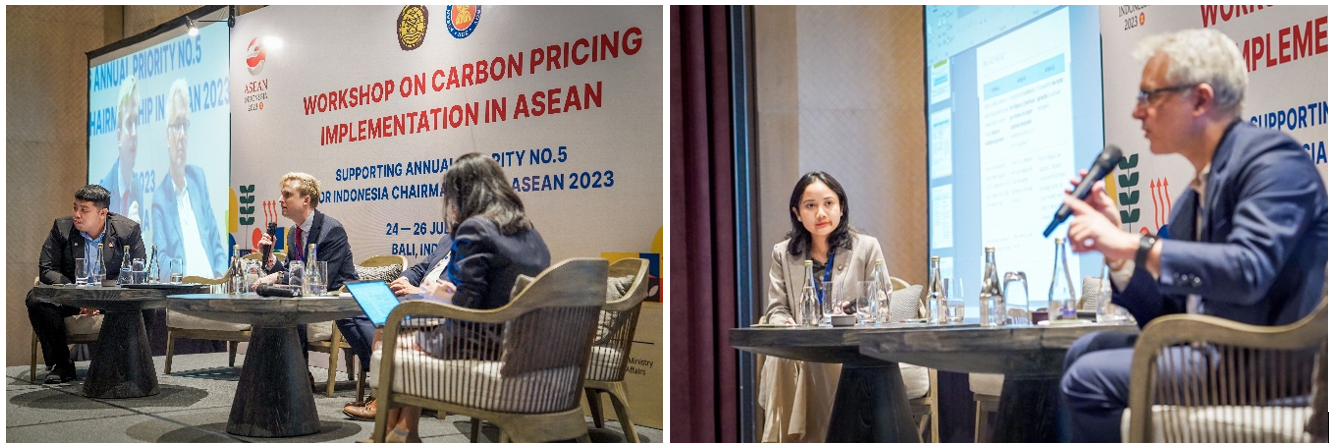
Workshop Day 2
Moving on to the second day that was moderated by Mr I Dewa Made Raditya Margenta, Research Analyst of ACCEPT II and Ms Indira Pradnyaswari, Associate Research Analyst of ACCEPT II, it focused on in-depth policy design and training on the Climate Policy Assessment Tool (CPAT) by Mr Simon John Newport Black, Economist at the International Monetary Fund (IMF). Participants received practical training on CPAT application to foster effective decision-making in carbon pricing strategies.
They also explored the multiplier effects of carbon pricing on the domestic economy, including its impact on economic growth, investment attractiveness, energy prices, and job creation. Carbon taxes were highlighted for offering certainty and flexibility in revenue recycling, while comprehensive policy packages and complementary policies were deemed essential for successful carbon pricing implementation. Pro-poor revenue recycling strategies through carbon pricing were explored, with countries considering various options to maximise the positive impact on emission reduction and sustainable economic growth. MRV’s role in unlocking climate finance and tracking progress on climate goals was emphasised.
On the second day, participants also learned about Article 6 of the Paris Agreement with Mr Jens Radschinski, Regional Expert on Art 6 and Carbon Pricing at UNFCCC/IGES RCC Asia Pacific and Dr Yuqing Yu, Programme Manager of UNFCCC/IGES RCC Asia Pacific. Article 6 was recognised as an important tool for engaging the private sector and supporting developing countries in achieving their Nationally Determined Contributions (NDCs) targets.
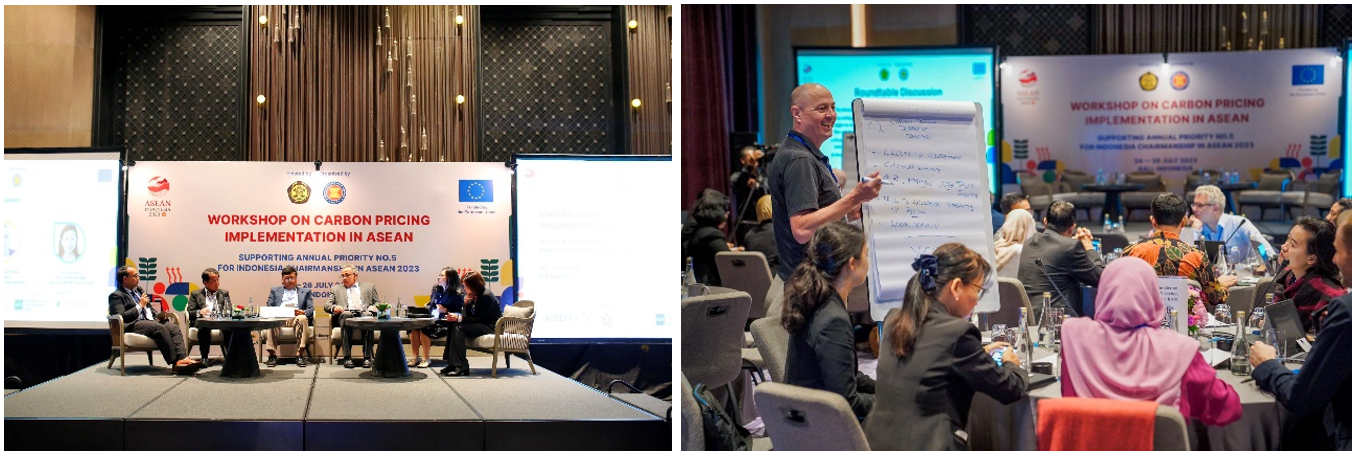
Workshop Day 3
The final day, moderated by Ms Aldilla Noor Rakhiemah, Senior Research Analyst of ACCEPT II featured roundtable discussions on carbon pricing impact on energy security and decarbonisation efforts. To provide a better understanding on carbon pricing as a tool to intertwine energy, economy, and climate, all participants were divided into several small groups and sparked an insightful discussion. Ms Latifahaida Abdul Latief, Assistant Director at the ASEAN Secretariat, Prof. Indra Overland, Head of Research Group at NUPI and Mr Tetsuya Nomoto, Senior Researcher at MRI presented scene setting presentations and later facilitated the roundtable discussion with other speakers from the previous days including Mr Jose Miguel Ruiz Verona, Team Leader at TAF-GTEI and Mr Bernhard Meyhofer, Key Expert Clean Energy at TAF-GTEI. Participants appreciated the incremental approach to carbon pricing, as seen in the EU, for its predictability and learning opportunities in countries with diverse economic development and capacity. Carbon pricing was acknowledged as a catalyst tool that can promote renewable energy penetration and support the implementation of clean technologies such as Carbon Capture and Storage (CCS) technology.
The workshop also addressed the Carbon Border Adjustment Mechanism (CBAM), targeting carbon-intensive products imported by the EU. Ms Alina Manrique de Lara, Policy Officer, European Commission presented the EU’s CBAM Regulation, explaining the objective and functioning and outlined the implementation steps. Moderated by Mr Muhammad Shidiq, Senior Research Analyst of ACCEPT II, participants discussed the implementation’s transition phase starting in October 2023 and its potential impact on ASEAN’s industrial sectors, including iron & steel, cement, fertilisers, aluminium, and electricity generation.
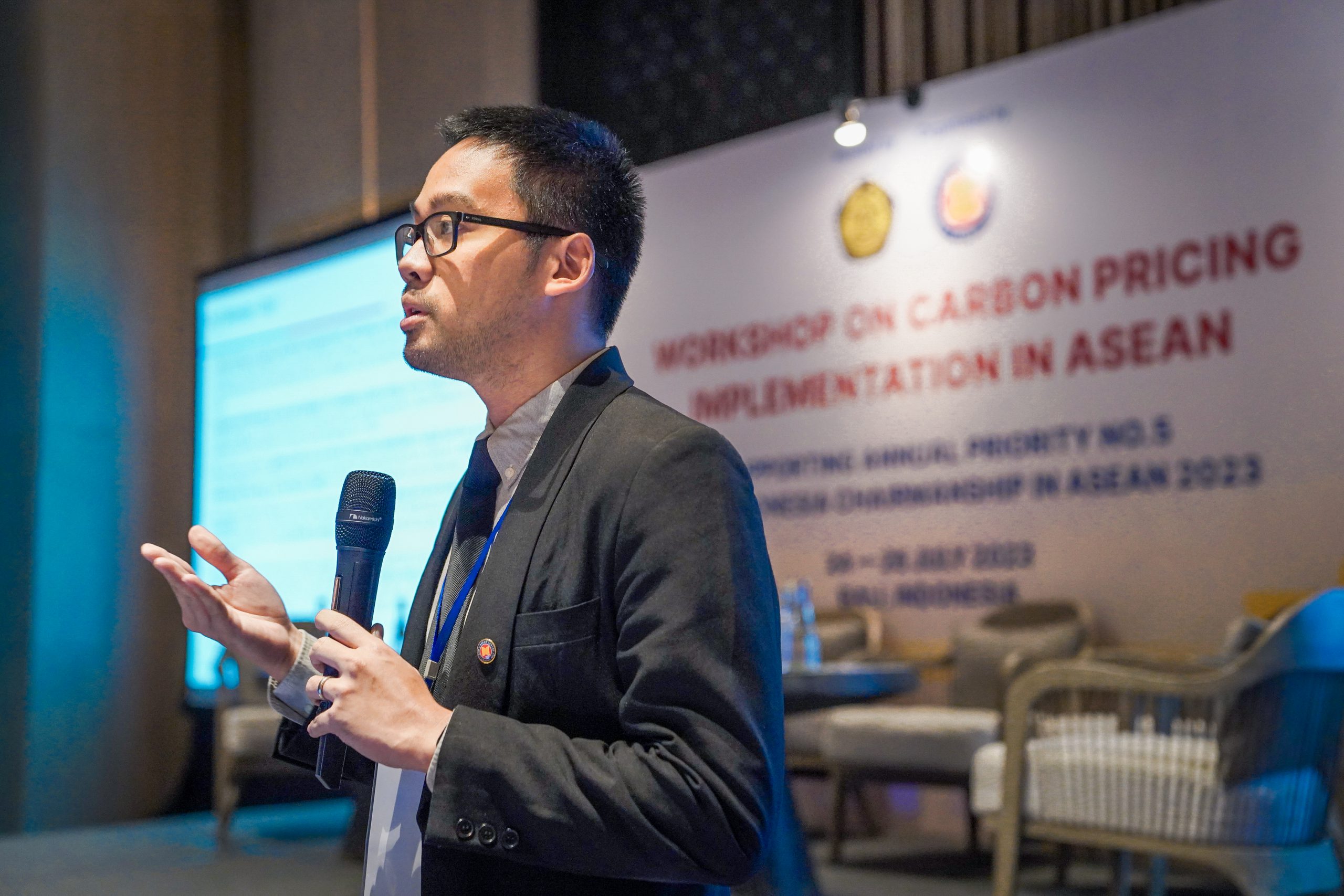
Mr Rizky Aditya Putra, Senior Officer of APAEC at ACE during closing remarks
The outcomes of this workshop will notably be presented at the 41st ASEAN Ministers on Energy Meeting (AMEM) in Bali, Indonesia, further shaping regional policies and deepening energy-climate knowledge within ASEAN. The workshop’s resounding success signifies the unwavering commitment of ASEAN countries in combatting climate change and fostering sustainable development.
In the closing remarks, Mr Rizky Aditya Putra, Senior Officer of APAEC at ACE, expressed his gratitude on behalf of the ASEAN Centre for Energy (ACE) to all participants and speakers for their valuable contributions to the workshop. ACE remains committed to facilitating ongoing dialogues and cooperation among ASEAN countries, dialogue partners, and international organisations to ensure a sustainable energy future in the region. On behalf of EU Delegation in Indonesia and Brunei Darussalam, Mr Andreas Unterstaller as the Programme Officer on Climate Change, Environment, and Energy expressed his hope that the workshop will inspire action and momentum of change across borders, both among ASEAN member states and between ASEAN and its partners, including the European Union, which has had a long-standing partnership for 46 years.
Further details about ACCEPT II can be found at https://accept.aseanenergy.org/.
We welcome any future collaboration, please feel free to contact us at [email protected]